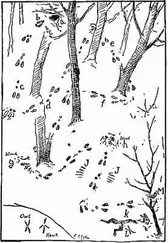Ernest Seton - Rolf in the Woods
Здесь есть возможность читать онлайн «Ernest Seton - Rolf in the Woods» весь текст электронной книги совершенно бесплатно (целиком полную версию без сокращений). В некоторых случаях можно слушать аудио, скачать через торрент в формате fb2 и присутствует краткое содержание. Год выпуска: 1997, Жанр: Приключения про индейцев, Исторические приключения, на английском языке. Описание произведения, (предисловие) а так же отзывы посетителей доступны на портале библиотеки ЛибКат.
- Название:Rolf in the Woods
- Автор:
- Жанр:
- Год:1997
- ISBN:нет данных
- Рейтинг книги:3 / 5. Голосов: 1
-
Избранное:Добавить в избранное
- Отзывы:
-
Ваша оценка:
- 60
- 1
- 2
- 3
- 4
- 5
Rolf in the Woods: краткое содержание, описание и аннотация
Предлагаем к чтению аннотацию, описание, краткое содержание или предисловие (зависит от того, что написал сам автор книги «Rolf in the Woods»). Если вы не нашли необходимую информацию о книге — напишите в комментариях, мы постараемся отыскать её.
Rolf in the Woods — читать онлайн бесплатно полную книгу (весь текст) целиком
Ниже представлен текст книги, разбитый по страницам. Система сохранения места последней прочитанной страницы, позволяет с удобством читать онлайн бесплатно книгу «Rolf in the Woods», без необходимости каждый раз заново искать на чём Вы остановились. Поставьте закладку, и сможете в любой момент перейти на страницу, на которой закончили чтение.
Интервал:
Закладка:
The reply was simply, "Ugh! you are Nibowaka."
"We'll take your offer, if we can fix it up about payment, for I have no money with me and barely two hundred dollars at the cabin."
"You half tabac and grosairs?"
"Yes, plenty."
"You can go 'get 'em? Si?"
Rolf paused, looked down, then straight at the Frenchman.
"Will you trust me to take half the fur now; when I come back with the pay I can get the rest."
The Frenchman looked puzzled, then, "By Gar you look de good look. I let um go. I tink you pretty good fellow, parbleu!"
So Rolf marched away with half the furs and four days later he was back and paid the pale-faced but happy Frenchman the one hundred and fifty dollars he had received from Van Cortlandt, with other bills making one hundred and ninety-five dollars and with groceries and tobacco enough to satisfy the trapper. The Frenchman proved a most amiable character. He and Rolf took to each other greatly, and when they shook hands at parting, it was in the hope of an early and happier meeting.
Francois la Colle turned bravely for the ninety-mile tramp over the snow to his home, while Rolf went south with the furs that were to prove a most profitable investment, shaping his life in several ways, and indirectly indeed of saving it on one occasion.
Chapter 68.
War
Eighteen hundred and twelve had passed away. President Madison, driven by wrongs to his countrymen and indignities that no nation should meekly accept, had in the midsummer declared war on Great Britain. Unfitted to cope with the situation and surrounded by unfit counsellors, his little army of heroic men led by unfit commanders had suffered one reverse after another.
The loss of Fort Mackinaw, Chicago, Detroit, Brownstown, and the total destruction of the American army that attacked Queenstown were but poorly offset by the victory at Niagara and the successful defence of Ogdensburg.
Rolf and Quonab had repaired to Albany as arranged, but they left it as United States scouts, not as guides to the four young sportsmen who wished to hark back to the primitive.
Their first commission had been the bearing of despatches to Plattsburg.
With a selected light canoe and a minimum of baggage they reached Ticonderoga in two days, and there renewed their acquaintance with General Hampton, who was fussing about, and digging useless entrenchments as though he expected a mighty siege. Rolf was called before him to receive other despatches for Colonel Pike at Plattsburg. He got the papers and learned their destination, then immediately made a sad mistake. "Excuse me, sir," he began, "if I meet with—"
"Young man," said the general, severely, "I don't want any of your 'ifs' or 'buts'; your orders are 'go.' 'How' and 'if' are matters for you to find out; that's what you are paid for."
Rolf bowed; his cheeks were tingling. He was very angry at what he thought a most uncalled for rebuke, but he got over it, and he never forgot the lesson. It was Si Sylvanne that put it into rememberable form.
"A fool horse kin follow a turnpike, but it takes a man with wits to climb, swim, boat, skate, run, hide, go it blind, pick a lock, take the long way, round, when it's the short way across, run away at the right time, or fight when it's wise—all in one afternoon." Rolf set out for the north carrying a bombastic (meant to be reassuring) message from Hampton that he would annihilate any enemy who dared to desecrate the waters of the lake.
It was on this trip that Rolf learned from Quonab the details of the latter's visit to his people on the St. Regis. Apparently the joy of meeting a few of his own kin, with whom he could talk his own language, was offset by meeting with a large number of his ancient enemies the Mohawks. There had been much discussion of the possible war between the British and the Yankees. The Mohawks announced their intention to fight for the British, which was a sufficient reason for Quonab as a Sinawa remaining with the Americans; and when he left the St. Regis reserve the Indian was without any desire to reenter it.
At Plattsburg Rolf and Quonab met with another Albany acquaintance in General Wilkinson, and from him received despatches which they brought back to Albany, having covered the whole distance in eight days.
When 1812 was gone Rolf had done little but carry despatches up and down Lake Champlain. Next season found the Americans still under command of Generals Wilkinson and Hampton, whose utter incompetence was becoming daily more evident.
The year 1813 saw Rolf, eighteen years old and six feet one in his socks, a trained scout and despatch bearer.
By a flying trip on snowshoes in January he took letters, from General Hampton at Ticonderoga to Sackett's Harbour and back in eight days, nearly three hundred miles. It made him famous as a runner, but the tidings that he brought were sad. Through him they learned in detail of the total defeat and capture of the American army at Frenchtown. After a brief rest he was sent across country on snowshoes to bear a reassuring message to Ogdensburg. The weather was much colder now, and the single blanket bed was dangerously slight; so "Flying Kittering," as they named him, took a toboggan and secured Quonab as his running mate. Skookum was given into safe keeping. Blankets, pots, cups, food, guns, and despatches were strapped on the toboggan, and they sped away at dawn from Ticonderoga on the 18th of February 1813, headed northwestward, guided by little but the compass. Thirty miles that day they made in spite of piercing blasts and driving snow. But with the night there began a terrible storm with winds of zero chill. The air was filled with stinging, cutting snow. When they rose at daylight they were nearly buried in drifts, although their camp was in a dense, sheltered thicket. Guided wholly by the compass they travelled again, but blinded by the whirling white they stumbled and blundered into endless difficulties and made but poor headway. After dragging the toboggan for three hours, taking turns at breaking the way, they were changing places when Rolf noticed a large gray patch on Quonab's cheek and nose.
"Quonab, your face is frozen," he said.
"So is yours," was the reply.
Now they turned aside, followed a hollow until they reached a spruce grove, where they camped and took an observation, to learn that the compass and they held widely different views about the direction of travel. It was obviously useless to face the storm. They rubbed out their frozen features with dry snow and rested by the fire.
No good scout seeks for hardship; he avoids the unnecessary trial of strength and saves himself for the unavoidable. With zero weather about them and twenty-four hours to wait in the storm, the scouts set about making themselves thoroughly comfortable.
With their snowshoes they dug away the snow in a circle a dozen feet across, piling it up on the outside so as to make that as high as possible. When they were down to the ground, the wall of snow around them was five feet high. Now they went forth with the hatchets, cut many small spruces, and piled them against the living spruces about the camp till there was a dense mass of evergreen foliage ten feet high around them, open only at the top, where was a space five feet across. With abundance of dry spruce wood, a thick bed of balsam boughs, and plenty of blankets they were in what most woodmen consider comfort complete.
They had nothing to do now but wait. Quonab sat placidly smoking, Rolf was sewing a rent in his coat, the storm hissed, and the wind-driven ice needles rattled through the trees to vary the crackle of the fire with a "siss" as they fell on the embers. The low monotony of sound was lulling in its evenness, when a faint crunch of a foot on the snow was heard. Rolf reached for his gun, the fir tree screen was shaken a little, and a minute later there bounded in upon them the snow covered form of little dog Skookum, expressing his good-will by excessive sign talk in which every limb and member had a part. They had left him behind, indeed, but not with his consent, so the bargain was incomplete.
Читать дальшеИнтервал:
Закладка:
Похожие книги на «Rolf in the Woods»
Представляем Вашему вниманию похожие книги на «Rolf in the Woods» списком для выбора. Мы отобрали схожую по названию и смыслу литературу в надежде предоставить читателям больше вариантов отыскать новые, интересные, ещё непрочитанные произведения.
Обсуждение, отзывы о книге «Rolf in the Woods» и просто собственные мнения читателей. Оставьте ваши комментарии, напишите, что Вы думаете о произведении, его смысле или главных героях. Укажите что конкретно понравилось, а что нет, и почему Вы так считаете.




